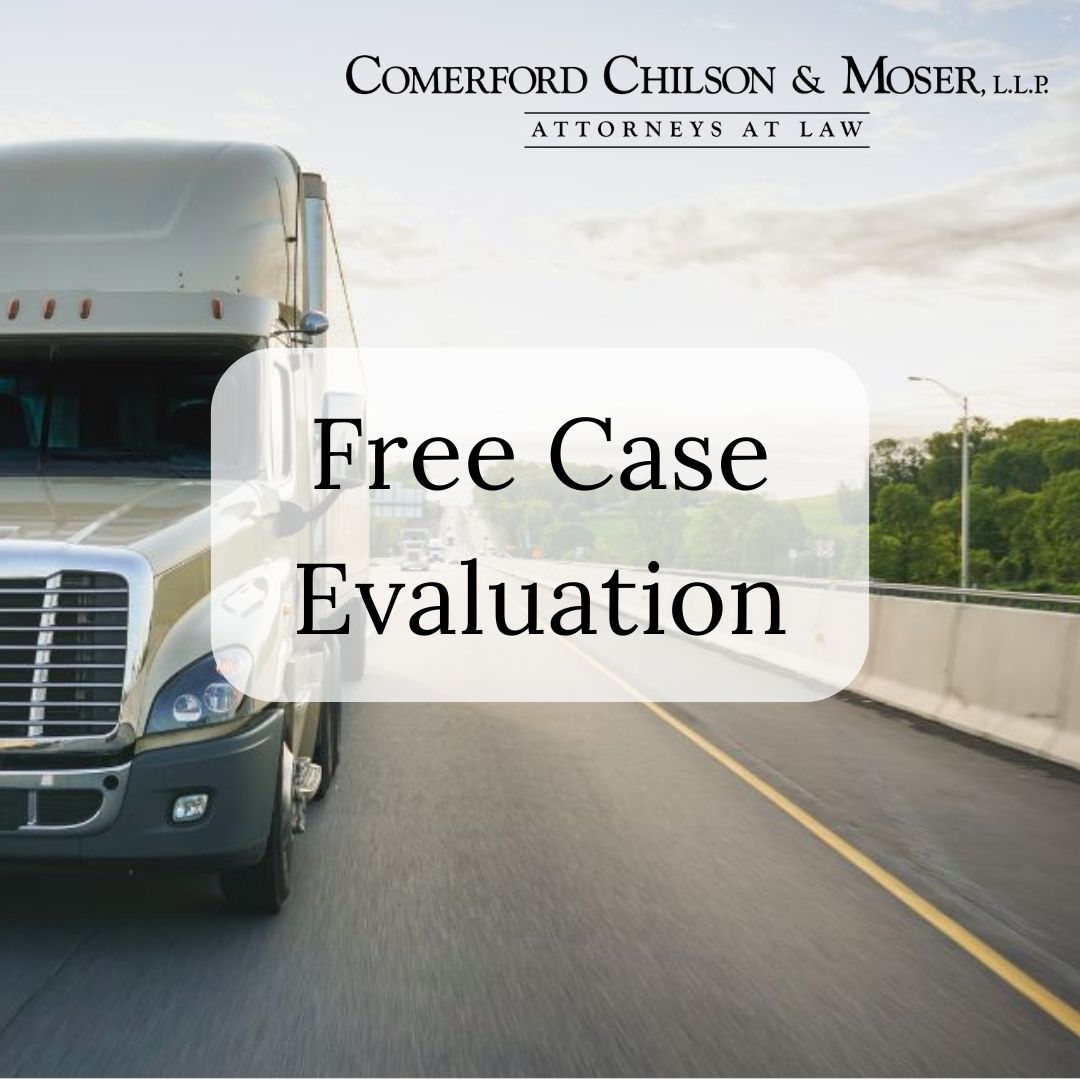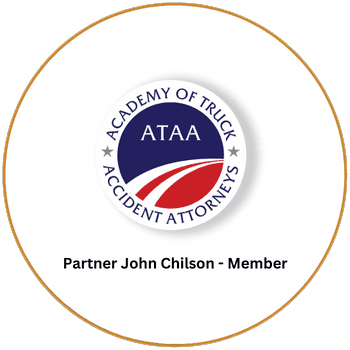
Truck Accident Lawyers in North Carolina
Fighting for Victims of Semi-Truck Accidents in Winston-Salem

Semi-truck accidents are some of the most devastating crashes that occur on North Carolina roadways. These accidents often lead to serious injuries and death due to the size and weight of commercial vehicles.
If you or a loved one was hurt in a truck collision, it is important to have an 18 wheeler accident lawyer in Winston-Salem on your side to fight for the compensation you deserve from all parties at fault.
Our firm handles all types of truck accidents, including those caused by:
- Truck driver negligence
- Mechanical failure
- Overweight trucks and unsafe loads
- Trucking company negligence
Accidents involving 18 wheelers often require detailed investigation to determine liability accurately. This is why it is crucial to work with a legal professional experienced in the nuances of commercial truck accidents. From analyzing driver logs to examining vehicle maintenance records, extensive resources may be utilized to build a strong claim. The financial and emotional stakes are high, making it critical to have experienced support during negotiations or possible litigation.
Call Comerford Chilson & Moser at (336) 568-8779 to schedule a free initial consultation.
Why Hire Comerford Chilson & Moser?

Comerford Chilson & Moser has been in business for over 20 years and has a proven track record of success handling a wide variety of personal injury cases. Our team of experienced North Carolina truck accident attorneys has handled every type of commercial trucking accident imaginable and we're not afraid to take a case to trial if necessary.
We're also highly selective in the cases we take on, so you can be confident that we'll give your case the individual attention it deserves. We're proud to say that we get a lot of our business through referrals from satisfied clients.
By hiring our firm, you can trust that we will:
- Thoroughly investigate the cause of the truck accident
- Gather evidence, including accident reports and witness statements
- Consult with medical experts to assess the extent of your injuries and the necessary medical treatment
- Calculate the full extent of your damages, including medical expenses, lost wages, and pain and suffering
- Negotiate with insurance companies to seek a fair settlement
- Take your case to trial if necessary, to fight for the compensation you deserve
A central part of our approach involves collaboration with a network of specialists from various fields, ensuring a comprehensive understanding of your situation. Our team meticulously scrutinizes every aspect of your case, from the accident's initial circumstances to the long-term impact on your health and finances. This commitment ensures we provide a thorough and strategic representation tailored to your specific needs.
If you are hoping for the best possible outcome for your case, you need our firm on your side. With over 90 years of cumulative experience, we feel we are the obvious choice for those seeking representation after a serious 18 wheeler accident. We will answer any questions you may have regarding your truck accident case. If your case is taken on, we will begin to review the facts of your case immediately.
Our FAQ
-
What important steps should be taken immediately following a truck accident?
The first thing that should be done, of course, is to get medical attention for anyone who is seriously injured. Beyond that, here are some key steps that can help you in a personal injury lawsuit:
- Report the accident to your insurance company
- Provide as many details as possible to police and file an accident report
- Take photos of the accident scene to record important details, including damage to vehicles and other property
- Do not speak with any other insurance company representatives or sign any reports
- Do not make any statements of who was at fault or the extent of your injuries
- Contact an experienced personal injury attorney
- See a doctor as soon as possible following an accident
-
Who can I collect from in a truck accident personal injury lawsuit?
Personal injury lawsuits regarding semi truck accidents can become complex rather quickly. Often, it is possible to name more than one party in a lawsuit. Our experienced truck accident lawyers help victims maximize the amount they recover by naming all responsible parties. This may include:
- The driver of the truck
- The owner of the truck company
- The employer of the driver, which may be different than the truck owner
- The owner of the tractor-trailer, which can be different than the owner of the truck itself
- The manufacturer of the truck, tractor-trailer or any parts of the truck or cab
- A third-party maintenance company
- A municipality that contributed to the accident by creating dangerous road conditions or not properly marking dangerous conditions
-
What compensation can be recovered following a truck accident?An injured party may seek compensation for immediate and future medical expenses, lost wages, lost future earnings, pain and suffering, loss of quality of life, and other damages. In wrongful death lawsuits, a decedent’s family may seek lost economic contributions, loss of care and companionship, funeral expenses, and other damages.
-
What laws apply to truck drivers that may play a role in my case?
Federal, state and local laws that apply to commercial trucks and their drivers can play an important role in a personal injury lawsuit. The Federal Motor Carrier Safety Administration (FMCSA) regulates the commercial trucking industry. Laws apply to:
- The number of hours a driver can work in a given period of time
- The training a driver must have completed
- Drug and alcohol use by drivers (significantly lower blood alcohol concentration levels)
- The maintenance schedule of the truck and tractor-trailer
- The weight limit of the truck and its load
Federal regulations also require commercial trucks to carry certain levels of insurance coverage. This protects victims of truck accidents from truck owners or companies stating that they do not have the financial resources to pay damages.
Often, trucking companies will take elaborate steps to place their assets under a different entity in order to avoid paying damages in these cases. We work with forensic accountants and other specialists who are skilled at uncovering a company’s true assets in order to clear the way for our clients to collect the full amount they are owed.
-
How can I determine liability in a semi-truck accident case?
Determining liability in a semi-truck accident case can be complex. An experienced truck accident lawyer can investigate the accident, review evidence, and analyze factors such as truck driver negligence, mechanical failures, and trucking company negligence to establish liability.
-
How long do I have to file a semi-truck accident claim in North Carolina?
In North Carolina, the statute of limitations for filing a personal injury claim, including a semi-truck accident claim, is typically three years from the date of the accident. It's crucial to act promptly and consult with a lawyer to ensure your legal rights are protected.
-
What evidence do I need to gather at the scene of a truck accident?
Gathering evidence at the scene of a truck accident is crucial for building a strong claim. Documenting the accident scene can aid in establishing liability and fault.
- Start by taking clear photographs of the scene, including vehicle damage, skid marks, road signs, and any visible injuries. If possible, capture the positioning of the vehicles involved and the surrounding environment to give context to the accident.
- Collect contact information from all parties involved, including their names, phone numbers, and insurance details, as well as witness accounts and their contact information.
- Additionally, note down details like the time and date of the accident, weather conditions at the time, and any road hazards that may have contributed to the incident.
- Police reports are invaluable, so make sure law enforcement is called to the scene and a report is filed.
- The complexity of truck accidents involves factors unique to these vehicles, such as cargo logs and driver's rest schedules, which can significantly impact the determination of fault.
Consulting with a truck accident attorney can further guide you on what specific evidence will support your claim most effectively.
-
How can I tell if I have a claim against a trucking company?
Determining whether you have a valid claim against a trucking company involves several critical considerations. Central to this determination is the identification of negligence or breach of duty that directly led to the accident and your resultant injuries. This negligence could be in various forms, including driver error, inadequate vehicle maintenance, or oversights in adhering to federal trucking regulations. A claim might also arise if the trucking company failed in its hiring, training, or supervision of the driver, implying a systemic problem contributing to the crash.
You'll also need to establish that the trucking company is legally responsible for the conduct of its employees—usually the case under employment law. Engaging the services of a knowledgeable truck accident lawyer is pivotal in assessing your situation comprehensively. The lawyer can help gather the necessary evidence, consult experts, and develop a strategic approach to prove the fault. Because truck accident claims are inherently complex, involving state and federal laws, having legal representation can significantly enhance the likelihood of a favorable outcome.
-
What if my truck accident was caused by a defective part?
If a truck accident was caused by a defective part, several parties might be held accountable, extending beyond just the driver involved. Determining liability in such scenarios often involves the manufacturer of the faulty component, distributors, and, in some cases, the maintenance service provider if the defect was due to poor maintenance or installation.
In a product liability claim, it's crucial to demonstrate that the defective part directly caused the accident and resulting injuries; this typically requires a thorough investigation and expert testimony.
These types of claims can become particularly complicated as they may involve multiple defendants across different jurisdictions, necessitating a coordinated legal strategy. Detailed product analysis, review of manufacturing processes, and tracing the chain of distribution might be necessary to build a compelling case.
Consulting with a truck accident attorney at Comerford Chilson & Moser ensures the necessary steps are taken to hold all responsible parties accountable, aiming to secure compensation for any damages sustained due to the defect.
-
How does insurance work for truck accidents?
Insurance coverage for truck accidents is often more complex than for standard vehicular accidents due to the commercial nature of the vehicles involved. Typically, trucking companies are required to carry higher liability limits given the potential for severe damage and catastrophic injuries in the event of an accident.
These policies are designed to cover extensive property damage, medical expenses, and even compensation for lost wages and pain and suffering. However, dealing with insurance companies can be challenging as they may attempt to minimize payouts or dispute claims.
It is crucial for victims to understand the nuances of commercial insurance and the coverage that might be available to them. Engaging a truck accident attorney can be invaluable in navigating this landscape, as an experienced lawyer can advocate on the victim's behalf, ensure all applicable policies are scrutinized, and negotiate effectively with insurers. This ensures that victims are not left struggling with out-of-pocket expenses or denied the compensation they are rightfully entitled to under their circumstances.
-
Why is legal representation important after a truck accident?
Legal representation following a truck accident is critical due to the complexity and magnitude of such cases. Truck accidents often involve multiple parties, including drivers, trucking companies, vehicle manufacturers, and insurance agencies, each bringing its own set of legal challenges.
An attorney experienced in trucking laws can navigate these complexities, identify liable parties, and enforce the victim's rights to fair compensation. Attorneys are skilled in negotiating with insurance companies to secure favorable settlements that reflect the true extent of a victim's damages.
Moreover, a lawyer can uncover evidence that may not be readily accessible to a layperson, such as black box data, maintenance logs, and driver's histories, each of which can significantly impact the case's trajectory.
Having legal counsel also provides peace of mind, allowing victims to focus on recovery while their legal affairs are managed professionally and thoroughly. At Comerford Chilson & Moser, our attorneys are committed to delivering comprehensive legal support, helping our clients through every step of their journey to justice.

Why Our Clients Choose Us
Lawyers You Can Rely on When You're Injured
-
Committed to Taking Every Step Toward the Best Possible Outcome
-
Nearly a Century of Combined Experience
-
Boutique Law Firm with A Personal Approach to Every Case
-
Outstanding Reputation in The Legal Community

We Work with Specialists to Build Strong Cases
Truck accidents can be devastating to families, yet trucking companies often seem to have the advantage in settling any lawsuits because they have experienced lawyers who are adept at minimizing the amount paid to victims. Many trucking companies have insurance representatives respond to an accident scene immediately to begin building a case that will help them limit their liability.
At Comerford Chilson & Moser, L.L.P., our truck accident attorneys in North Carolina are dedicated to fighting for the rights of victims in Winston-Salem and throughout the state.
We understand the complexities of truck accident cases and work with specialists to build strong cases on behalf of our clients, including:
- Medical experts to validate the injuries you have suffered
- Accident reconstructionists and investigators to prove liability
- Commercial vehicle safety experts
Contact our truck accident attorneys in North Carolina for a free consultation. You can reach out to us online or call (336) 568-8779.


Our Reputation
Speaks For Itself
-
"I feel so fortunate to have been represented by the attorneys and staff at Comerford Chilson & Moser"The attorneys and staff at Comerford Chilson & Moser are one top-notch organization. While it is unfortunate we met under these circumstances, I am forever grateful to their team and I plan to keep in touch with everyone at this amazing firm.- Chip L.
-
"The Lawyers at Comerford, Chilson, & Moser Walked Us Through Every Aspect of The Case"When it was finally complete, they explained what we should expect going forward and continued to check on how we are doing — after more than 10 years. I can’t thank them enough for all they did and would highly recommend the firm...- Jeff Simon
-
"I Had the Comfort of Knowing I Had the Very Best Law Team on My Side"Our case was multi-faceted, intricate, and very challenging, so having the best lawyers was top priority. I know I had the best, and I highly recommend The entire firm of Comerford, Chilson & Moser.- Denise J.
-
"I Would Highly Recommend Him to My Family and Friends"During our first meeting, he assured me that he would take this anxiety and responsibility from me. Emotionally, I felt a deep sense of relief that stayed with me during the months he was working for me.- Roberta T.
-
"I Cannot Speak Highly Enough of This Firm"I cannot speak highly enough of this firm. Comerford and Moser were extremely dedicated to the case and getting results. If you're looking for an amazing firm that actually cares about you, I recommend Comerford Chilson and Moser.- Braeden Barr
-
"My Needs Were Met and My Family Is Taken Care Of"After being involved in an accident involving a semi, an attorney friend researched attorneys that specialize in the type of accident and injuries I had. Comerford, Chilson and Moser received the highest recommendation. We met and immediately felt at ease- Paul Taylor
